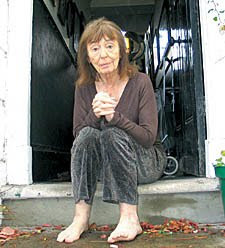
I was sad to hear the news that the great Australian conductor Charles Mackeras died yesterday. He was, and it is not for me to assess his abilities, one of the greatest conductors of recent times and someone who crossed my path on a couple of memorable occasions. I had similar thoughts when I heard, last week, about the death of the novelist Beryl Bainbridge.

I have been lucky, well mostly, in my old career in television that I have met many famous people and both of these recently deceased figures from the arts will retain a place of affection somewhere in my celebrity-jaded heart.
I suppose I should be referring to these people with their full titles: Sir Alan Charles Maclaurin Mackerras, AC, CH, CBE and Dame Beryl Margaret Bainbridge, DBE but that just doesn’t seem right. It was good that they were honoured in the lifetimes, knighted and be-damed and all the other gongs that came their way but both, I like to think, were much more down-to-earth people than those rather pompous sounding orders of empire suggest.
I produced a television series about Northern English writers some years ago and the Liverpudlian Beryl Bainbridge was one of the guests. I remember her as being marvelously informal, and let’s be honest, attractively dotty right from the start. She had made an effort in her appearance and made a point in checking with me whether she looked alright or not. At that time I hadn’t realized that “dressing up” wasn’t really her thing. She was splendidly forthright in the televised interview with the also now sadly deceased Tony Wilson who was my ever-enthusiastic colleague in these programmes but by the end of that recording day, Beryl had decided that I needn’t have worn that tie and Tony didn’t need the suit either.
By a strange coincidence I was in a restaurant in London’s Camden Town a few weeks after this event and I saw what I at first took to be a bag lady wandering around outside. I couldn’t place her for a moment and then clocked that it was Beryl. I went out to say hello and to ask her why she was carrying a plastic bucket. I received a kiss on the check and, ask a silly question, the answer that she was using the bucket as a basket for her shopping. It was the last time I saw her but the image will remain.
I never saw Charles Mackeras with a plastic bucket but, in my experience, he was never the “maestro” in terms of grand behaviour. He was a distinguished and highly regarded conductor and a brilliant musicologist whose work on Mozart and Janacek would have been enough to have given him fame in classical musical circles without his undoubted brilliance as a conductor but he behaved like a working musician and an ordinary bloke in love with the music.
As a schoolboy, I went on a school trip to the Sadler’s Wells theatre in London to see my first opera production, Bizet’s Carmen in the English National Opera production. I was astounded and hooked on opera for life so, well I was an enthusiastic schoolboy, I went round to the stage door afterwards and got the cast to sign my programme…..they were all very friendly and obliging and then out came the conductor, one Charles Mackeras who asked me, with charming humility, if I wanted his autograph too. I remember, for a moment, trying to think who he had played on stage then sussed that he has been conducting. With the arrogance of youth I answered, “I suppose so.” I have kept all my opera programmes and this delightful document to his charm and my ignorance is still up in the loft in a box.
Many years later, I was working as a producer-director of arts programmes at Granada Television in Manchester and I was making a series of films about a young singing student at the Royal Northern College of Music in Manchester. Her name was Amanda Roocroft and she has now become a highly regarded operatic star but in those days she was at the beginning of her career and I had committed to following her career as a way of documenting the thrills and pitfalls of pursuing a career in opera. With amazing rapidity, her particular star rose and quite unexpectedly, this originally local televison documentary took on much bigger proportions.
Amanda had been asked to make her professional debut by Welsh National Opera as Sophie in a new production of Richard Strauss’ opera Der Rosenkavalier. The conductor was the, by then, Sir Charles Mackeras and I duly went off with a film crew to Cardiff.
I was pretty new at this directing game at the time so it was with some trepidation that I stood on the stage on the set of Der Rosenkavalier planning to film the scene known as the Presentation of the Rose with a large film crew, two opera singers, members of the Welsh National Opera chorus, an orchestra of over eighty musicians in the pit and a very well-known conductor waiting at the rostrum in the orchestra pit.
This was the man who I had last met as a very green schoolboy and now all eyes were on me for my call of “action!” That was bad enough but, some two or three minutes into this sensational music, I could see that there was a lighting problem and I was genuinely scared when I thought, I have to shout “cut!”
Shout was the point as the music was thunderous but, I had no choice. “Cut!” I shouted and everything came to an immediate halt. I can see now how people could let power go to their heads. I have never felt so centre stage in my life, before or since. The second call of “cut!” wasn’t half as bad and after three takes, I could dismiss the orchestra with some relief.
We took a break and I sat upstairs over a coffee with Charles Mackeras where we did a short interview. Throughout this, for me nerve-wracking day, he had remained totally calm, easy-going in his response to my instructions and, one hundred per cent engaged in the music for this piece of filming. He was, in fact, the same humble man that had asked if I wanted his autograph all those years before.
By another odd coincidence, his relatively new award-winning recordings of the great Mozart symphonies was sitting in my cd player when I heard the news of his death.
Here he is conducting the slow movement from Mozart’s Prague Symphony which shows that, even in his eighties, he was always alert and inventive in his music-making bringing out all of Mozart’s darkness and light in this perfectly controlled performance. One of the themes is, I think though I am sure others have different opinions, the melody that Elgar used for his Enigma Variations, his orchestra suite celebrating the lives of his friends, so this piece seems appropriate as a memorial to two, if not friends, then acquaintances, who will be fondly remembered. This movement is, like Charles Mackeras, easily under-valued with its fuss-free handling of joy and despair under a coating of charm.
